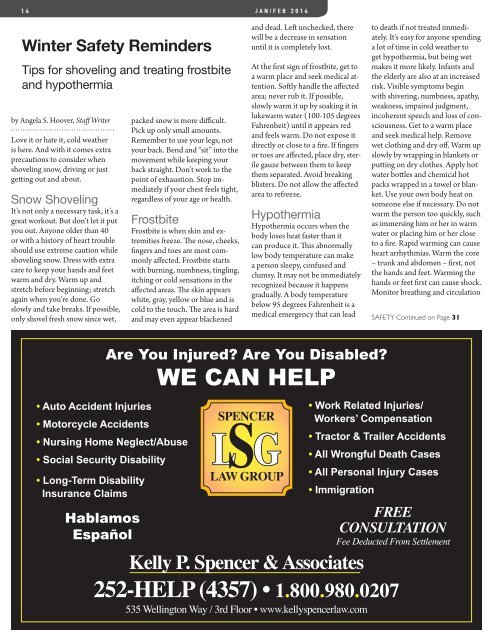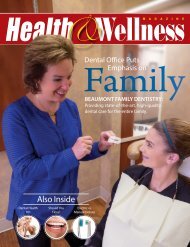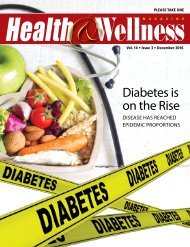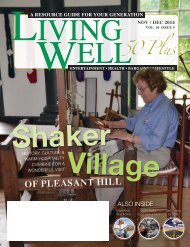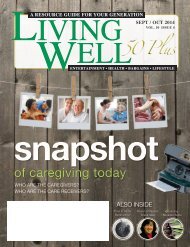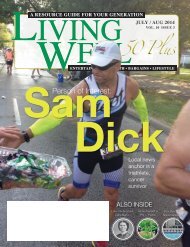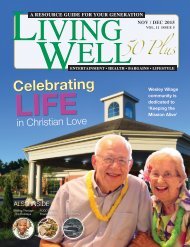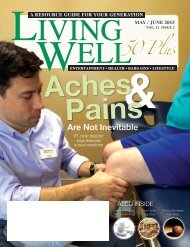Living Well 60+ January-February 2014
You also want an ePaper? Increase the reach of your titles
YUMPU automatically turns print PDFs into web optimized ePapers that Google loves.
1 4 JAN/FEB 2 0 1 4<br />
Winter Safety Reminders<br />
Tips for shoveling and treating frostbite<br />
and hypothermia<br />
by Angela S. Hoover, Staff Writer<br />
Love it or hate it, cold weather<br />
is here. And with it comes extra<br />
precautions to consider when<br />
shoveling snow, driving or just<br />
getting out and about.<br />
Snow Shoveling<br />
It’s not only a necessary task, it’s a<br />
great workout. But don’t let it put<br />
you out. Anyone older than 40<br />
or with a history of heart trouble<br />
should use extreme caution while<br />
shoveling snow. Dress with extra<br />
care to keep your hands and feet<br />
warm and dry. Warm up and<br />
stretch before beginning; stretch<br />
again when you’re done. Go<br />
slowly and take breaks. If possible,<br />
only shovel fresh snow since wet,<br />
packed snow is more difficult.<br />
Pick up only small amounts.<br />
Remember to use your legs, not<br />
your back. Bend and “sit” into the<br />
movement while keeping your<br />
back straight. Don’t work to the<br />
point of exhaustion. Stop immediately<br />
if your chest feels tight,<br />
regardless of your age or health.<br />
Frostbite<br />
Frostbite is when skin and extremities<br />
freeze. The nose, cheeks,<br />
fingers and toes are most commonly<br />
affected. Frostbite starts<br />
with burning, numbness, tingling,<br />
itching or cold sensations in the<br />
affected areas. The skin appears<br />
white, gray, yellow or blue and is<br />
cold to the touch. The area is hard<br />
and may even appear blackened<br />
and dead. Left unchecked, there<br />
will be a decrease in sensation<br />
until it is completely lost.<br />
At the first sign of frostbite, get to<br />
a warm place and seek medical attention.<br />
Softly handle the affected<br />
area; never rub it. If possible,<br />
slowly warm it up by soaking it in<br />
lukewarm water (100-105 degrees<br />
Fahrenheit) until it appears red<br />
and feels warm. Do not expose it<br />
directly or close to a fire. If fingers<br />
or toes are affected, place dry, sterile<br />
gauze between them to keep<br />
them separated. Avoid breaking<br />
blisters. Do not allow the affected<br />
area to refreeze.<br />
Hypothermia<br />
Hypothermia occurs when the<br />
body loses heat faster than it<br />
can produce it. This abnormally<br />
low body temperature can make<br />
a person sleepy, confused and<br />
clumsy. It may not be immediately<br />
recognized because it happens<br />
gradually. A body temperature<br />
below 95 degrees Fahrenheit is a<br />
medical emergency that can lead<br />
to death if not treated immediately.<br />
It’s easy for anyone spending<br />
a lot of time in cold weather to<br />
get hypothermia, but being wet<br />
makes it more likely. Infants and<br />
the elderly are also at an increased<br />
risk. Visible symptoms begin<br />
with shivering, numbness, apathy,<br />
weakness, impaired judgment,<br />
incoherent speech and loss of consciousness.<br />
Get to a warm place<br />
and seek medical help. Remove<br />
wet clothing and dry off. Warm up<br />
slowly by wrapping in blankets or<br />
putting on dry clothes. Apply hot<br />
water bottles and chemical hot<br />
packs wrapped in a towel or blanket.<br />
Use your own body heat on<br />
someone else if necessary. Do not<br />
warm the person too quickly, such<br />
as immersing him or her in warm<br />
water or placing him or her close<br />
to a fire. Rapid warming can cause<br />
heart arrhythmias. Warm the core<br />
– trunk and abdomen – first, not<br />
the hands and feet. Warming the<br />
hands or feet first can cause shock.<br />
Monitor breathing and circulation<br />
SAFETY Continued on Page 31<br />
• Auto Accident Injuries<br />
• Motorcycle Accidents<br />
Are You Injured? Are You Disabled?<br />
WE CAN HELP<br />
• Nursing Home Neglect/Abuse<br />
• Social Security Disability<br />
• Long-Term Disability<br />
Insurance Claims<br />
Hablamos<br />
Español<br />
SPENCER<br />
LS<br />
G<br />
LAW GROUP<br />
• Work Related Injuries/<br />
Workers’ Compensation<br />
• Tractor & Trailer Accidents<br />
• All Wrongful Death Cases<br />
• All Personal Injury Cases<br />
• Immigration<br />
FREE<br />
CONSULTATION<br />
Fee Deducted From Settlement<br />
Kelly P. Spencer & Associates<br />
252-HELP (4357) • 1.800.980.0207<br />
535 <strong>Well</strong>ington Way / 3rd Floor • www.kellyspencerlaw.com


